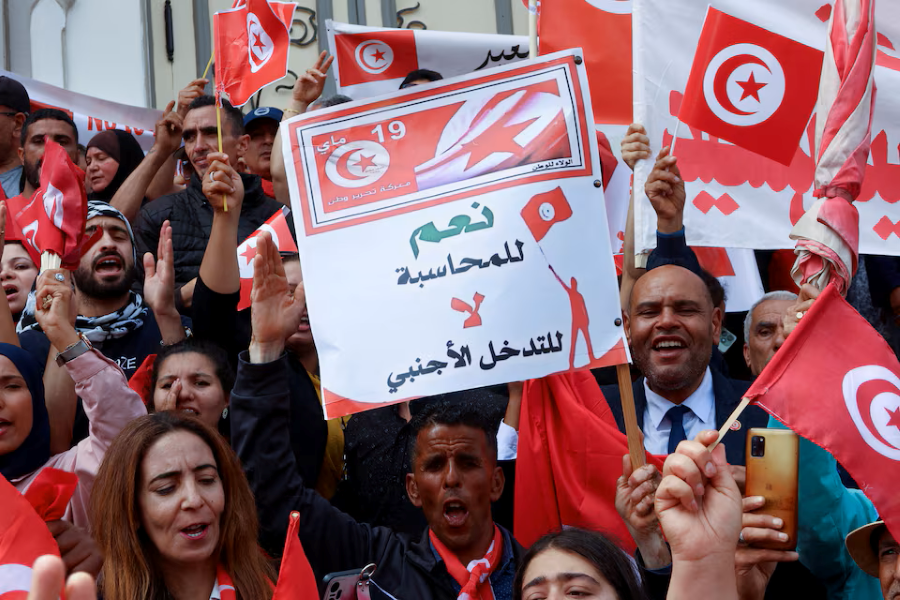In Summary
• Opposition parties and human rights groups accuse authorities of unfair practices
• 11 opposition candidates face hurdles in obtaining required documentation
• Concerns raised over government control of media, judiciary, and Election Commission
• Arrests and legal actions against opposition figures spark controversy
TUNIS, TUNISIA– As Tunisia approaches its presidential election scheduled for October 6, the political landscape is becoming increasingly contentious. Opposition parties, presidential candidates, and human rights organizations have leveled serious accusations against the authorities, claiming the use of “arbitrary restrictions” and intimidation tactics to secure the re-election of incumbent President Kais Saied.
The controversy comes in the wake of Saied’s July 19 announcement of his bid for another five-year term. Saied, who was first elected in 2019, has faced criticism for dissolving parliament in 2021 and ruling by decree, actions the opposition has labeled as a coup. His statement that he will not relinquish power to those he deems “non-patriots” has further fueled concerns about the democratic process.
With the August 6 deadline for candidate registration fast approaching, 11 opposition figures aspiring to challenge Saied have issued a joint statement criticizing the authorities. They allege that violations “have affected most of the serious candidates to the point that they appear to indicate a desire to exclude them (from the election) and restrict them in order to make way for a specific candidate.”
A key point of contention is the new requirement for candidates to obtain a document certifying they have no criminal record. As of now, none of the 11 opposition candidates have secured this crucial document, effectively hindering their ability to register. The Election Commission spokesperson has stated that the interior ministry will contact candidates to provide the necessary documentation, but no timeline has been specified.
Adding to the controversy, 17 non-governmental organizations (NGOs), including the Human Rights League, along with six opposition parties, have raised alarms about government control over public media, the judiciary, and the Election Commission. Their joint statement warns that the current “climate of intimidation of opponents and journalists through the use of the judiciary and the Election Commission to serve the interests of the authorities and the lack of equal opportunities does not provide guarantees for free and fair elections.”
Individual cases have further highlighted the tensions. Presidential candidate Nizar Chaari reports that his campaign manager and a volunteer were arrested, with police confiscating signatures endorsing his candidacy. While the Public Prosecutor’s office claims the arrests were related to database seizure and forgery of endorsements, Chaari’s campaign denies these accusations.
Other opposition figures have faced legal challenges. Lotfi Mraihi, an opposition party leader and one of Saied’s most vocal critics, was sentenced to eight months in prison on charges of vote buying and received a lifetime ban from running in presidential elections. Another candidate, Abd Ellatif Mekki, has been barred by a judge from media appearances and domestic travel.
These developments have prompted calls for action from within the political establishment. Hela Ben Jaballah, head of the Freedoms Committee in Parliament, has urged the lifting of restrictions on candidates and called on the Election Commission to maintain neutrality in its role.
The Election Commission, for its part, has rejected accusations of bias, insisting that it performs its duties impartially. However, the mounting allegations and restrictions have cast a shadow over the upcoming election’s integrity and fairness.
As Tunisia navigates this turbulent political period, the international community watches closely. The outcome of this election and the manner in which it is conducted will likely have significant implications for Tunisia’s democratic trajectory and its relationships with global partners.
With less than two months until the election, the pressure is mounting on all sides to ensure a free, fair, and transparent electoral process that upholds the principles of democracy that Tunisia has strived to establish since its 2011 revolution.
https://www.africanexponent.com/accusations-fly-as-tunisias-presidential-election-marred-by-allegations-of-intimidation-and-restrictions/


